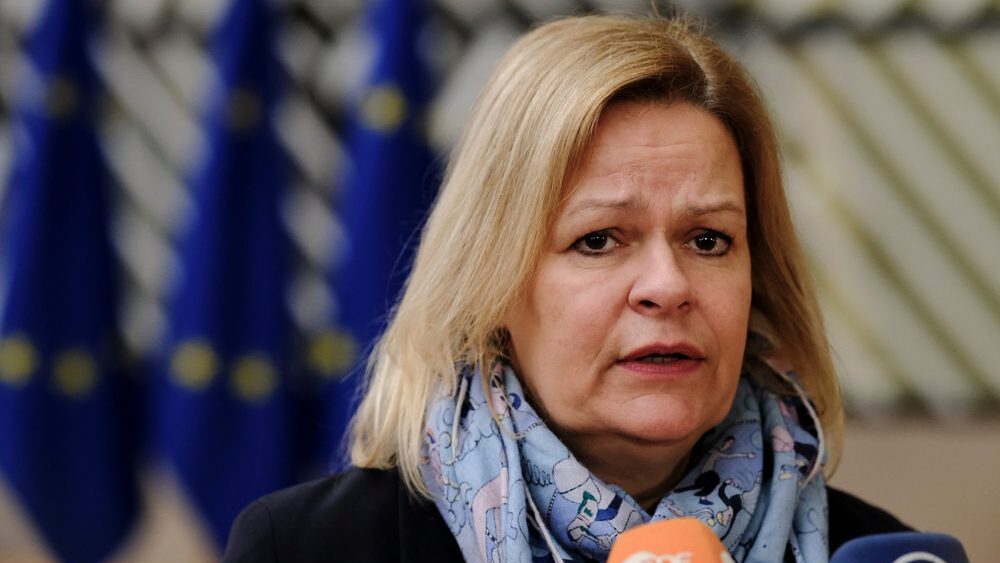
Nancy Faeser
Photo: Alexandros Michailidis / Shutterstock.com
Germany’s left-wing Interior Minister Nancy Faeser has suggested extending the right to vote to foreigners in local elections, including those who may only have been in the country for as little as six months.
Faeser, who is the top candidate for the Social Democrats (SPD) in the October 8th regional elections in Hesse, stated,
We want to work emphatically at the federal level and in the Bundesrat to ensure that all people who live in Hessian municipalities for more than six months have the right to vote in local elections.
Currently, only German citizens and European Union citizens can vote in local elections in Germany, but Faeser’s proposal would greatly expand the number of voters to both asylum seekers and other non-European Union nationals, Bild reports.
Manfred Pentz, a member of the centrist Christian Democratic Union (CDU) in Hesse, slammed the proposal saying,
The right to vote is not a pawn for election campaigns, but one of our highest democratic values and must be reserved for members of our state. To open up this right to vote arbitrarily and to link it only to mere residence instead of citizenship contradicts our democratic principles and we as the CDU clearly reject it.
German journalist and former editor-in-chief of the Welt am Sonntag newspaper Peter Huth also criticised the idea as playing into the hands of the populist Alternative for Germany (AfD).
In an opinion article for Die Welt, he wrote:
You only have to read the headline to understand who will benefit from this proposal: only the AfD, of course. The planned equality of refugees with German citizens at the ballot box, even if only in the local parliaments, is exactly the stuff from which the right-wing populists knit their fairy tales of [the Great Replacement], Great Reset and Germany abolishes itself. And as usual, this harvest is reaped by the AfD without any effort of its own, because the Minister of the Interior has already made it.
Huth went on to add that the entire proposal is meant to increase SPD voters and is aimed at retaining power, likening it to proposals to lower the voting age to 16 as younger people are believed to have more left-wing political leanings.
“It is hoped that the refugees will have a similar effect. Faeser doesn’t want anyone to participate, she simply wants to open up new target groups for her party. As if our democracy were a lifestyle product that has to be readjusted from time to time,” he said.
There have been attempts in the past by the media and some associations either calling for giving refugees the right to vote or questioning why they are not allowed to vote in Germany.
In 2021, broadcaster CNN highlighted several activists calling on Germany to allow non-citizens to vote in elections, some of whom argued that the process to become a German citizen was too long and difficult.
German lawyers also disagree on whether such a proposal is even possible under current law, with Berlin lawyer Matthias Zieger claiming a constitutional change would be needed and was unsure whether or not such an amendment would stand up to scrutiny, as a similar change was made in 1990 in Schleswig-Holstein and Hamburg and was rejected by the Federal Constitutional Court.
Professor Hans Meyer, meanwhile, claimed,
In the decisive Article 20 (of the Constitution), it only says; ‘the people vote’ and not, for example, ‘the German people vote.’ The moment one interprets this as the German people, the possible voters are reduced to nationals. There is nothing in the Constitution about the question of whether foreigners living here are allowed to vote or not.
The proposed change comes as the anti-mass migration Alternative for Germany (AfD) continues to rise in the polls across the country, polling at a record-high 22% in a national poll released by Forsa this week. Another survey by the GMS Institute released Tuesday put the AfD at 23%.
The populist party’s approval has surged, as it looks set to place first in several East German regions, including Thuringia, Saxony, and Brandenburg.
